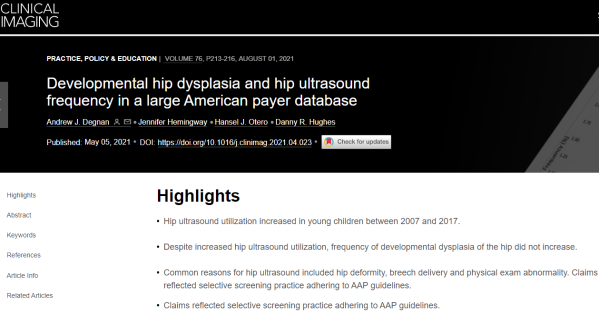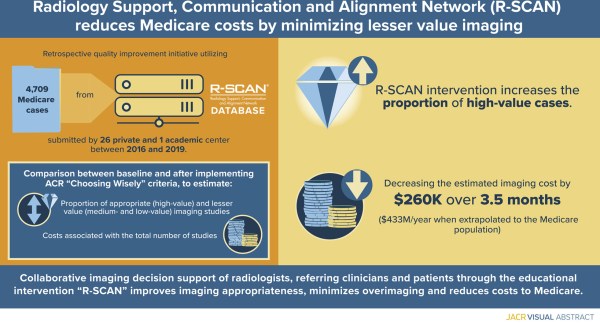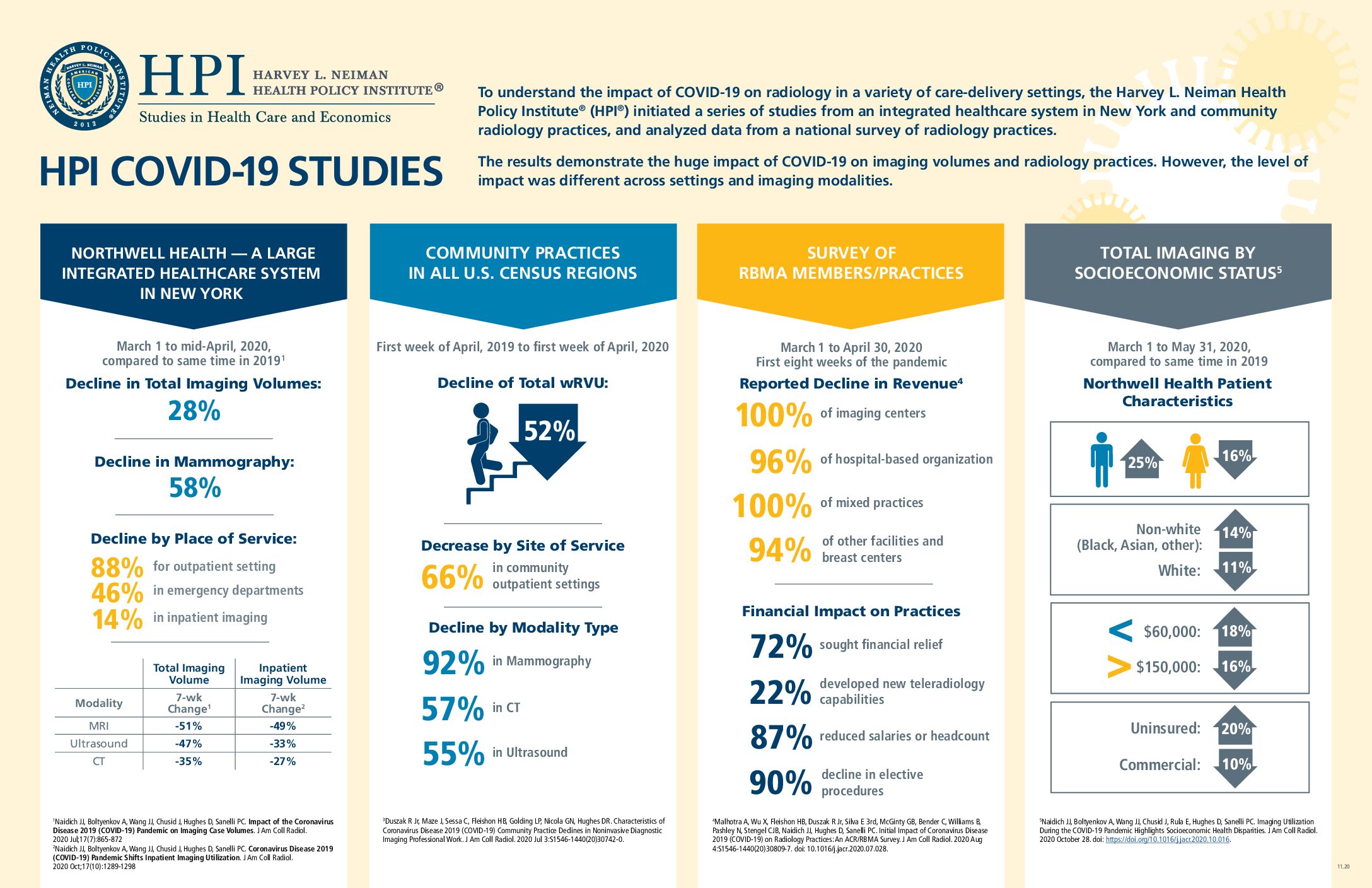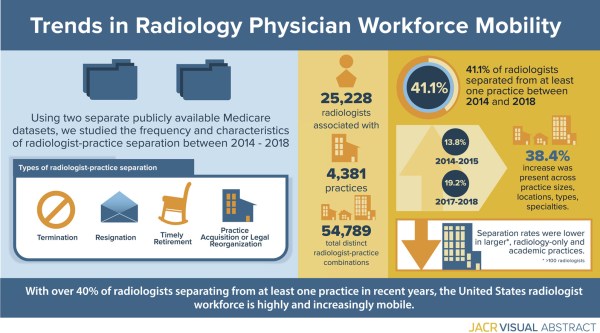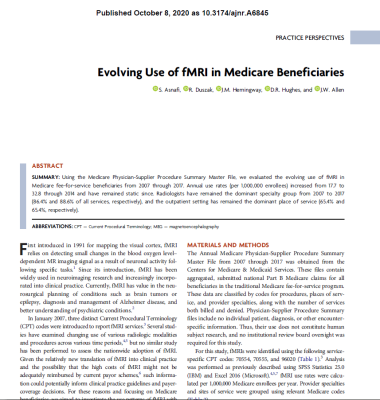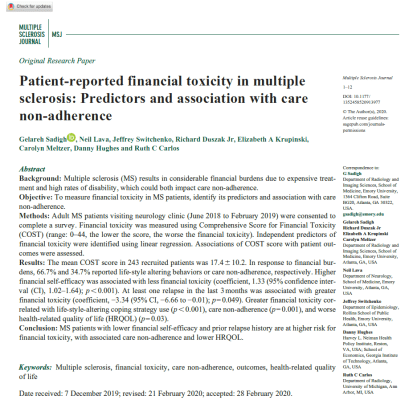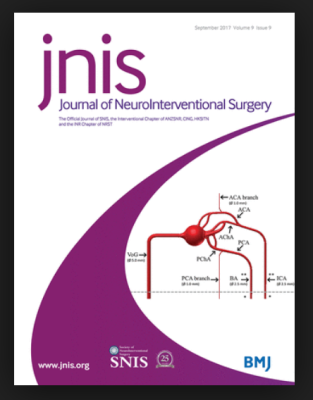Developmental dysplasia of the hip (DDH) is an important contributor to musculoskeletal morbidity, but effective strategies to screen for DDH remain controversial. The current utilization of hip ultrasound (US) screening for DDH in the United States is not defined. This study utilized Optum's de-identified Clinformatics® Data Mart, a large commercial and Medicare Advantage claims database. Full Article
Andrew J. Degnan, MD, Jennifer Hemingway, MS, Hansel Otero, Danny R. Hughes, PhD. 2021. "Developmental Hip Dysplasia and Hip Ultrasound Frequency in a Large American Payer Database," Clinical Imaging
The Affordable Care Act of 2010 mandated private health plans to fully cover the services recommended by the U.S. Preventive Services Task Force. In June 2016, the Task Force added computed tomography colonography to its list of recommended tests for colorectal cancer screening. This study evaluates the association among the updated recommendation, patient cost-sharing obligations, and the uptake of colorectal cancer screening through computed tomography colonography in the privately insured population. Full Article
Steven Chen, MSPH, Courtney C. Moreno, MD, Richard Duszak Jr., MD, Michal Horny, PhD. 2021. "U.S. Preventive Services Task Force Update and Computed Tomography for Colorectal Cancer Screening Among Privately Insured Population," American Journal of Preventative Medicine
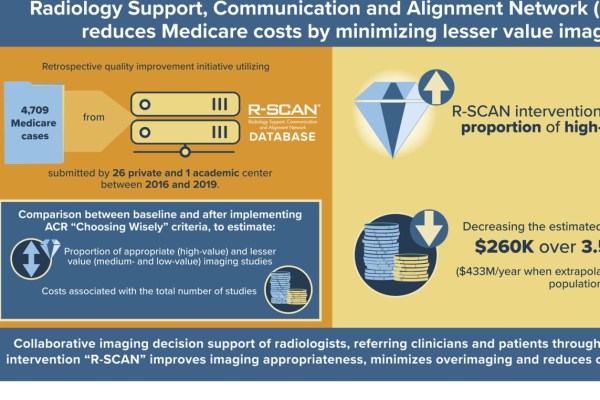
The Radiology Support, Communication and Alignment Network (R-SCAN) is a quality improvement program through which patients, referring clinicians, and radiologists collaborate to improve imaging appropriateness based on Choosing Wisely recommendations and ACR Appropriateness Criteria. R-SCAN was shown previously to increase the odds of obtaining an appropriate, higher patient or diagnostic value, imaging study. In the current study, the researchers aimed to estimate the potential imaging cost savings associated with R-SCAN use for the Medicare population. Full Article
Max Wintermark, MD, MAS, MBA , Andrew B. Rosenkrantz, MD, Paymon G. Rezaii, MS, Nancy Fredericks, MBA, Laura Chaves Cerdas, MS, Judy Burleson, MHSA, G. Rebecca Haines, MSM, CPXP, Mythreyi Chatfield, PhD William T. Thorwarth Jr., MD, Richard Duszak Jr., MD, Danny R. Hughes, PhD. 2021. "Predicted Cost Savings Achieved by the Radiology Support, Communication and Alignment Network from Reducing Medical Imaging Overutilization in the Medicare Population," Journal of American College of Radiology (JACR)
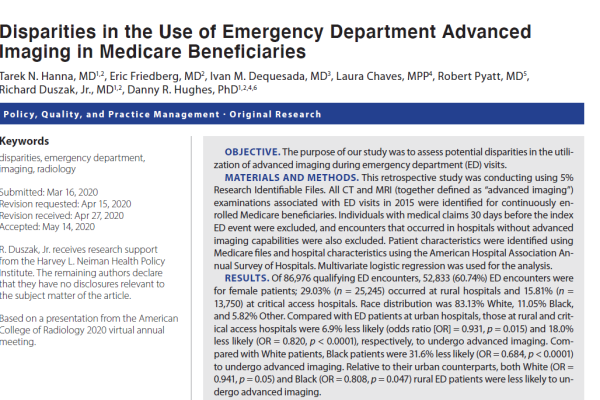
The purpose of this study was to assess potential disparities in the utilization of advanced imaging during emergency department (ED) visits. This retrospective study was conducting using 5% Research Identifiable Files. All CT and MRI (together defined as “advanced imaging”) examinations associated with ED visits in 2015 were identified for continuously enrolled Medicare beneficiaries. Among Medicare beneficiaries receiving care in U.S. EDs, significant disparities exist in advanced imaging utilization. Although imaging appropriateness was not investigated, these findings suggest inequity. Further research is necessary to understand why consistent health benefits do not translate into consistent imaging access among risk-adjusted ED patients. Full Article
Tarek N. Hanna, MD, Eric Friedberg, MD, Ivan M. Dequesada, MD, Laura Chaves, MPP, Robert Pyatt, MD, Richard Duszak, Jr., MD, Danny R. Hughes, PhD. 2021. "Disparities in the Use of Emergency Department Advanced Imaging in Medicare Beneficiaries," American Journal of Roentgenology
January 11, 2021
The Radiology Support, Communication and Alignment Network (R-SCAN) is a quality improvement program through which patients, referring clinicians, and radiologists collaborate to improve imaging appropriateness based on Choosing Wisely recommendations and ACR Appropriateness Criteria. In the current study, we aimed to estimate the potential imaging cost savings associated with R-SCAN use for the Medicare population. View Infographic
November 29, 2020
To understand the impact of COVID-19 on radiology in a variety of care-delivery settings, the Harvey L. Neiman Health Policy Institute (HPI®) initiated a series of studies from an integrated healthcare system in New York and community radiology practices, and analyzed data from a national survey of radiology practices. View the infographic to see how COVID-19 affected imaging volumes and radiology practices. View Infographic
November 13, 2020
Using two separate publicly available Medicare datasets, the researchers studied the frequency and characteristics of radiologist-practice separation between 2014 – 2018. View Infographic
Using the Medicare Physician-Supplier Procedure Summary Master File, we evaluated the evolving use of fMRI in
Medicare fee-for-service beneficiaries from 2007 through 2017. Annual use rates (per 1,000,000 enrollees) increased from 17.7 to
32.8 through 2014 and have remained static since. Radiologists have remained the dominant specialty group from 2007 to 2017
(86.4% and 88.6% of all services, respectively), and the outpatient setting has remained the dominant place of service (65.4% and
65.4%, respectively). Full Article
Solmaz Asnafi, MD, Richard Duszak Jr, MD, Jennifer M. Hemingway, MS, Danny R. Hughes, PhD, Jason W. Allen, MD, PhD. 2020. "Evolving Use of fMRI in Medicare Beneficiaries," American Journal of Neuroradiology
Multiple sclerosis (MS) results in considerable financial burdens due to expensive treatment and high rates of disability, which could both impact care non-adherence. Full Article
Gelareh Sadigh, Ruth Carlos, Carolyn Meltzer, Jeffrey M. Switchenko, Neil Lava, Rich Duszak, Danny Hughes, Elizabeth Anne Krupinski. 2020. "Patient-reported financial toxicity in multiple sclerosis: Predictors and association with care non-adherence," Multiple Sclerosis
The toll of burnout on healthcare is significant and associated with physician depression and medical errors. The objective of this study it to assess the prevalence and risk factors for burnout among neurointerventionalists. Full Article
Kyle M Fargen, Adam S Arthur, Thabele Leslie-Mazwi, Rebecca M Garner, Carol A Aschenbrenner, Stacey Q Wolfe, Sameer A Ansari, Guilherme Dabus, Alejandro Spiotta, Maxim Mokin, Italo Linfante, J Mocco, Joshua A Hirsch. 2019. "Survey Measures Burnout Among Neurointerventionalists," Journal of NeuroInterventional Surgery

